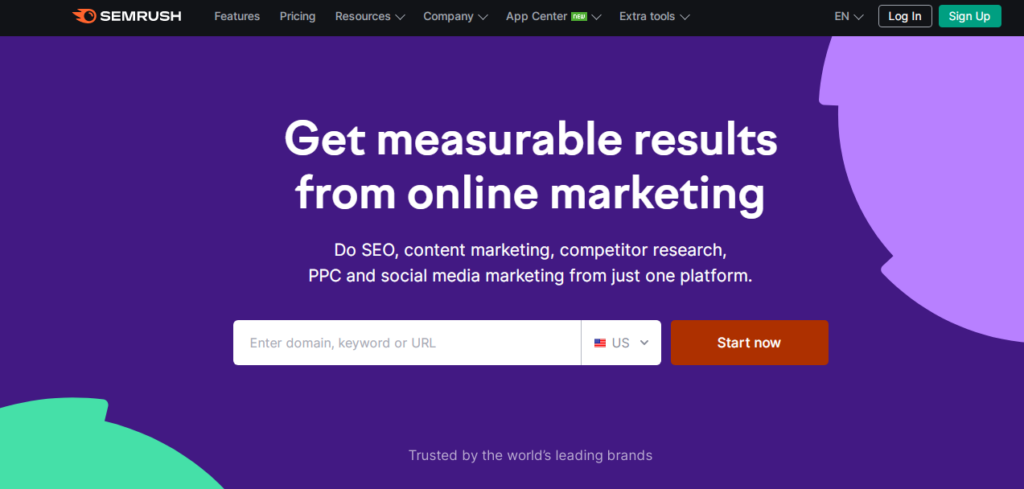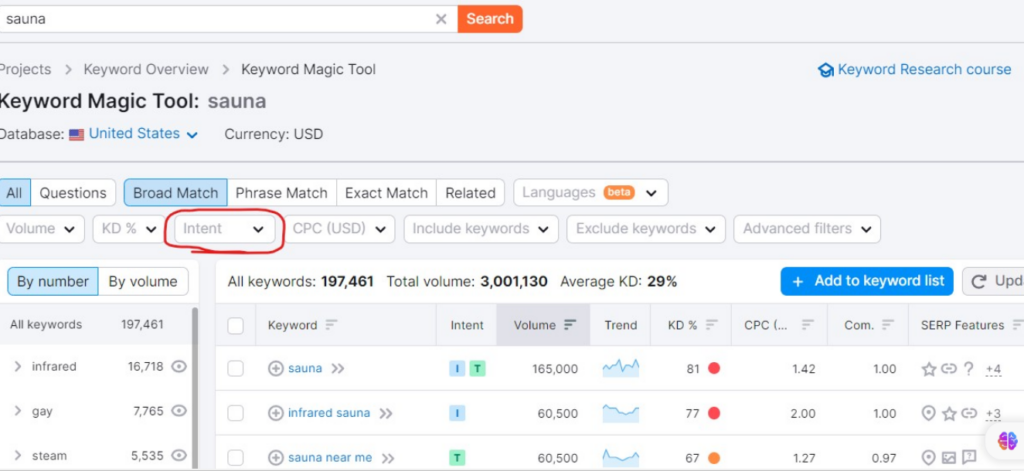In the ever-changing landscape of digital marketing, understanding the nuances of targeting keywords is of paramount importance.
Mastery of transactional, informational, navigational, and commercial keywords holds primary significance for companies looking to establish their presence on the internet. They provide unique opportunities for engagement, informing, and conversion.
What Are Transactional Keywords?
When people turn to Google for answers, they do so with specific intentions. This is quite distinct from platforms like TikTok or YouTube, where algorithms can take unpredictable paths. On Google, each user arrives with a unique goal:
- Hypochondriacs seek self-diagnosis;
- Spouses aim to prove each other wrong;
- Shoppers come to make purchases;
- Researchers seek information about potential purchases;
- And the list goes on.
Every search phrase used on Google falls into at least one of four main categories:
- Transactional;
- Navigational;
- Informational;
- Commercial.
In this guide, we’ll delve into these four categories and explore how you can leverage them for your business.
Keywords Are All About Intent
Whether you’re a contractor looking to boost your SEO expertise or a medical facility aiming to enhance the SEO of your practice, users turn to Google with a specific, often solvable problem in mind. Recognizing this intent can be a deciding factor for your business.
What Are Transactional Keywords?
According to SEMrush, transactional keywords indicate that a “user wants to complete an action (conversion).” They often include terms like:
- Buy;
- Purchase;
- Cheap;
- Best;
- Most affordable;
- Most reviews.
For example, a sauna manufacturing company like “Heating Co.” might use:
- Buy sauna online;
- Best infrared sauna;
- Sauna barrel with the most reviews.
How to Find Transactional Keywords?
Identifying transactional keywords is a straightforward process using the SEMrush keyword magic tool:
- Visit the SEMrush website.

- Navigate to the “Keyword Magic Tool.”

- Enter a general keyword and run the search.
<alt=” entering a general keyword in the search field”/>
- Filter the results by intent.

- Select “Transactional.”
However, it’s essential to note that the SEMrush filtering tool may not account for the specific nature of your business. Exercise caution and avoid trying to target every transactional keyword that appears.
What Type of Content Should You Create for Transactional Keywords?
The content you create to rank for transactional keywords depends on the specific subcategory:
- Local: These may require local SEO strategies and are often associated with finding local businesses;
- Qualifier-based: Often related to brand or product comparisons;
- Product-based: Relate to specific product searches.
For example, a search for “sauna with the most reviews” would yield results that involve optimizing a Google Business profile, primarily targeting local businesses.
What Are Informational Keywords?
Informational keywords indicate that a “user wants to find an answer to a specific question,” according to SEMrush. They are valuable because they often reflect users at the research stage, seeking information on topics that may eventually lead to a purchase.
How to Find Informational Keywords?
Discovering informational keywords is easy using SEMrush’s keyword magic tool:
- Visit the SEMrush website;
- Access the “Keyword Magic Tool.”;
- Enter a general keyword and initiate the search;
- Filter results by intent;
- Select “Informational.”;
- Consider sorting by question-based keywords for informational keywords.
For instance, queries such as “how to build a sauna” can be incredibly valuable as they attract users likely interested in purchasing saunas in the future.
Leveraging Informational Keywords for Remarketing
One advantage of attracting informational traffic is that it provides valuable data for email, display, and social media remarketing campaigns.
For example, if the fictional company “Heating Co.” creates an article about “Infrared Sauna vs. Traditional Sauna,” generating 1,000 monthly visitors, these visitors can be targeted strategically for education and potential conversion through remarketing campaigns.
What Type of Content Should You Create to Rank for Informational Keywords?
In most cases, educational articles or blog materials work well. Searches like “how long should you stay in a sauna” indicate a preference for informational articles. Similarly, “how to build a sauna” primarily yields articles and some video content in search results.
What Are Navigational Keywords?
As per SEMrush, navigational keywords arise when a “user wants to find a specific page or website.” These keywords are often used by users who are already familiar with a brand and prefer to use Google for quick access to a specific page or information instead of navigating the website manually.
How to Find Navigational Keywords?
Identifying navigational keywords is straightforward with SEMrush’s keyword magic tool:
- Visit the SEMrush website;
- Go to the “Keyword Magic Tool.”;
- Enter a general keyword and start the search;
- Filter results by intent;
- Choose “Navigational.”
Typically, your website’s homepage ranks high for general brand-related queries. However, delving into navigational keywords can unveil additional opportunities.
What Type of Content Should You Create to Rank for Navigational Keywords?
Concerning navigational keywords, your website’s homepage often ranks well for brand-related queries. Nevertheless, exploring navigational keywords can reveal supplementary possibilities.
For example, if you represent the fictional sauna manufacturing company “Almost Heaven Saunas,” you may discover users searching for “Almost Heaven Sauna Costco.” In this case, Costco dominates the search results, presenting a potential opportunity for Almost Heaven Saunas to create a dedicated page to redirect traffic.
Please note that the given translations are a close representation of the original text in American English.
What Are Commercial Keywords?
SEMrush defines commercial keywords as those where “the user wants to explore brands or services.” However, sometimes these keywords can overlap with navigational keywords, leading to confusion.
How to Find Commercial Keywords?
The search for commercial keywords can be carried out using the SEMrush keyword magic tool:
- Visit the SEMrush website;
- Navigate to the “Keyword Magic Tool.”;
- Enter a general keyword and initiate the search;
- Filter the results by intent;
- Select “Commercial.”
What Type of Content Should You Create to Rank for Commercial Keywords?
Due to the ambiguity of commercial keywords, it’s challenging to pinpoint specific content types. Commercial keywords often lead to informational or transactional content, making it difficult to categorize them separately.
Transactional vs. Informational vs. Commercial: What Should You Prioritize?
Now, let’s analyze the strengths and priorities of each type of keyword using a table:
| Keyword Type | Strengths | Prioritization |
|---|---|---|
| Transactional | – High conversion potential. | – Priority for immediate revenue generation. |
| – Clear intent to take action. | – Ideal for product-focused pages. | |
| – Easier to measure ROI. | – Effective for e-commerce businesses. | |
| – Direct impact on sales funnel. | ||
| Informational | – Builds brand authority and trust. | – Priority for long-term brand visibility. |
| – Attracts users in the research phase. | – Valuable for content marketing and SEO foundation. | |
| – Opportunity for nurturing leads. | – Effective for educational and informative content. | |
| – Expands the content library. | ||
| Commercial | – Balances between information and action. | – Priority for influencing purchase decisions. |
| – Engages users in the consideration stage. | – Ideal for comparison and review content. | |
| – Opportunity to guide users toward conversion. | – Effective for showcasing product/service benefits. |
There’s no one-size-fits-all answer when it comes to prioritizing keyword types. A well-thought-out SEO strategy often incorporates all three types to cater to user queries at different stages of their journey.
Understanding your audience and their intent is the key to striking the right balance and solving SEO challenges. So, think about your goals, analyze your target audience, and develop a keyword strategy that aligns with your business’s unique needs.
Conclusion
In the intricate world of SEO, choosing keywords can either make or break your strategy. Transactional, informational, and commercial keywords each have their unique advantages and applications, but prioritizing them remains a crucial decision. As we conclude our exploration of these keyword types, let’s review the key takeaways:
- Finding the Right Balance: There’s no one-size-fits-all answer when it comes to prioritizing keyword types. Your choice should align with your business goals, target audience, and their stage in the journey. Recognize that a well-crafted SEO strategy often combines all three keyword types to meet user needs at various stages;
- Transactional Keywords: Transactional keywords play a significant role when the primary goal is immediate conversion. They are a driving force for e-commerce enterprises and product-focused pages. Their direct impact on the sales funnel and clear intent make them invaluable for revenue generation;
- Informational Keywords: They appeal to users in the research stage, attracting potential customers and expanding your content library. Give them preference to ensure long-term brand visibility and content marketing;
- Commercial Keywords: They effectively influence purchase decisions, especially in comparative and review content. Use them strategically to showcase the advantages of your products or services;
- Audience-Centric Strategy: Ultimately, success lies in understanding your audience and their intent. Craft a keyword selection strategy tailored to your target audience, their goals, and their stage in the journey. A well-thought-out strategy ensures the effective fulfillment of their needs.
In the ever-evolving landscape of SEO, adaptability is key. Monitor keyword performance, analyze user behavior, and be prepared to adjust your strategy accordingly. Keep the conversation going with your audience by providing the right content at the right time.
Navigating the constantly changing SEO landscape, remember that prioritizing keyword types is just one piece of the puzzle. Building a comprehensive strategy that caters to audience interests and aligns with your business goals is the true path to SEO success. So, take action, analyze, optimize, and watch your online presence flourish.
